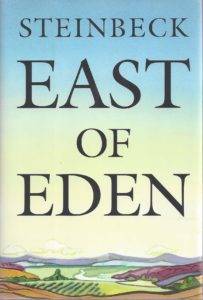Interfaith Insight - 2024
Permanent link for "Finding Truth In Great Literature; Will We Make The Right Choice?" By Douglas Kindschi, Sylvia and Richard Kaufman Founding Director, Kaufman Interfaith Institute, GVSU on June 4, 2024
Originally published August 13th 2015
Inspiration for my weekly Interfaith Insights usually comes from my reading non-fiction, but this column is an exception. On the recommendation of my orthopedic surgeon, this summer I read John Steinbeck’s classic, East of Eden .
So what does this novel have to do with interfaith? This retelling of the Genesis story is also the story of the conflict between good and evil and the struggle that is within each of us. The main character, Adam, discusses with his friend Samuel, and his servant Lee, possible names for his twin boys. They read the story of the biblical Adam’s two sons, Cain and Abel. They are at first bothered by Cain’s violent response to the rejection of his plant offering while Abel’s animal offering was accepted.
Lee comments: “I think this is the best known story in the world because it is everybody’s story. I think it is the symbol story of the human soul. … I think everyone in the world to a large or small extent has felt rejection. And with rejection comes anger, and with anger some kind of crime in revenge for the rejection. … There is the story of mankind.”
This passage reminds me of the alienation that some members in our society must feel when they find that they just don’t fit in, that they have been rejected because of racial difference or religious difference. For most this rejection is somehow overcome, but for others the rejection leads to anger and violent response. It is a sad commentary but perhaps, as Lee expressed, “the symbol story of the human soul.”
The discussion between Adam and his friends continues with puzzlement over the passage where the Lord responds to Cain’s anger that his offering is not accepted. The passage reads: “So the Lord said to Cain, ‘Why are you angry? And why has your countenance fallen? If you do well, will you not be accepted? And if you do not do well, sin lies at the door. And its desire is for you, but you should rule over it.” (Gen. 4:6-7)
Lee later discovers other translations of the passage and pursues the key passage by studying Hebrew with other learned men, including a respected rabbi. The key word that was translated “you should” rule over sin, is in Hebrew the word “timshel,” and can also be translated “thou mayest” or “you can” rule over sin. It is not a command but the recognition of human free will to resist the sin. It is a choice!
Friend Samuel exclaims, “Thou mayest, Thou mayest! What glory! It is true that we are weak and sick and quarrelsome, but if that is all we ever were, we would, millenniums ago, have disappeared from the face of the earth.” But we are given choice, we can choose to win over sin.
Later in the book, Steinbeck returns to what he calls the “one world story.”
“Humans are caught — in their lives, in their thoughts, in their hungers and ambitions, in their avarice and cruelty, and in their kindness and generosity too — in a net of good and evil. … Virtue and vice were warp and woof of our first consciousness, and they will be the fabric of our last. … There is no other story. A man, after he has brushed off the dust and chips of his life, will have left only the hard, clean questions: Was it good or was it evil? Have I done well — or ill?”
It all hinges on the single Hebrew word, “timshel,” “Thou mayest.” We have the choice. It is there in the early stories in Genesis. It is in great literature of the 20th century. It is with us today. It faces us as individuals, as nations, and in our attitudes toward others who are not like us. How will we respond to the sin at our door? Will we make the right choices?


